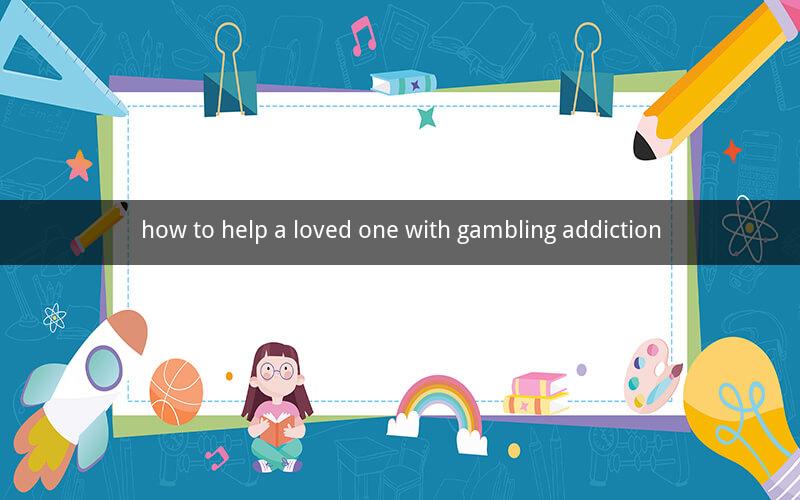
Directory
1. Understanding Gambling Addiction
2. Recognizing the Signs of Gambling Addiction
3. The Impact of Gambling Addiction on Relationships
4. Communicating with Your Loved One
5. Encouraging Professional Help
6. Providing Support through Treatment
7. Building a Support System
8. Coping with Relapse
9. Self-Care for the Helper
10. Resources and Further Reading
1. Understanding Gambling Addiction
Gambling addiction, also known as compulsive gambling, is a progressive disorder that affects the brain and behavior. It is characterized by an inability to control gambling behavior, despite negative consequences. Understanding the nature of gambling addiction is crucial in helping a loved one struggling with this issue.
2. Recognizing the Signs of Gambling Addiction
Identifying the signs of gambling addiction is the first step in providing support. These signs include:
- Secretive behavior around finances
- Borrowing money or selling personal belongings
- Missing work or school due to gambling
- Increasing debt
- Isolation from family and friends
- Changes in mood or behavior
3. The Impact of Gambling Addiction on Relationships
Gambling addiction can have a devastating impact on relationships. It can lead to financial strain, emotional turmoil, and trust issues. Recognizing the impact can help in understanding the urgency of the situation.
4. Communicating with Your Loved One
Effective communication is key in helping a loved one with gambling addiction. Here are some tips:
- Choose a calm and private setting
- Express your concerns without blame
- Use "I" statements to avoid sounding accusatory
- Listen actively and without judgment
- Offer support rather than ultimatums
5. Encouraging Professional Help
Seeking professional help is crucial in treating gambling addiction. Encourage your loved one to:
- Consult a therapist specializing in addiction
- Attend support groups for gamblers
- Consider residential or outpatient treatment programs
6. Providing Support through Treatment
Supporting your loved one through treatment involves:
- Educating yourself about gambling addiction
- Attending therapy sessions with your loved one
- Encouraging them to adhere to treatment plans
- Providing emotional support during difficult times
7. Building a Support System
Creating a support system for your loved one can increase the chances of recovery. This may include:
- Inviting friends and family to support groups
- Joining a support group for loved ones of gamblers
- Consulting with a counselor or therapist
8. Coping with Relapse
Relapse is a common part of the recovery process. Coping with relapse involves:
- Understanding that relapse does not mean failure
- Learning from the relapse and making necessary adjustments
- Continuing to provide support and encouragement
- Seeking additional resources if needed
9. Self-Care for the Helper
Taking care of yourself is crucial when helping a loved one with gambling addiction. This includes:
- Seeking support from friends, family, or professionals
- Engaging in self-care activities
- Maintaining a healthy lifestyle
- Setting boundaries to prevent burnout
10. Resources and Further Reading
For those seeking additional resources and information, the following resources and further reading are recommended:
- Gamblers Anonymous (ga.org)
- National Council on Problem Gambling (ncpgambling.org)
- American Psychiatric Association (psychiatry.org)
- National Institute on Drug Abuse (drugabuse.gov)
- National Council on Alcoholism and Drug Dependence (ncadd.org)
---
Frequently Asked Questions
1. Q: What are the first steps in helping a loved one with gambling addiction?
A: The first steps include recognizing the signs of addiction, expressing your concerns without blame, and encouraging your loved one to seek professional help.
2. Q: How can I communicate with my loved one about their gambling addiction?
A: Communicate in a calm and private setting, use "I" statements to avoid sounding accusatory, and listen actively without judgment.
3. Q: Should I confront my loved one about their gambling addiction?
A: While confrontation can be tempting, it may escalate the situation. A supportive and non-accusatory approach is often more effective.
4. Q: What types of professional help are available for gambling addiction?
A: Professional help includes therapy, support groups, and treatment programs. It may also involve financial counseling or legal assistance.
5. Q: How can I support my loved one through treatment?
A: Support involves educating yourself about addiction, attending therapy sessions, and providing emotional support during difficult times.
6. Q: What should I do if my loved one relapses?
A: Relapse is a part of the recovery process. Continue to offer support, learn from the relapse, and seek additional resources if needed.
7. Q: How can I take care of myself while helping a loved one with gambling addiction?
A: Engage in self-care activities, seek support from others, maintain a healthy lifestyle, and set boundaries to prevent burnout.
8. Q: Are there any support groups for loved ones of gamblers?
A: Yes, there are support groups like Gam-Anon, which provide a safe space for loved ones to share experiences and receive support.
9. Q: How can I help my loved one rebuild trust after a gambling relapse?
A: Rebuilding trust involves patience, understanding, and open communication. Encourage your loved one to take responsibility for their actions and work on rebuilding trust gradually.
10. Q: What resources are available for further information on gambling addiction?
A: Resources include Gamblers Anonymous, the National Council on Problem Gambling, the American Psychiatric Association, and the National Institute on Drug Abuse.